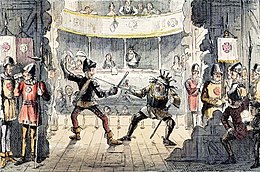
Drama Page 14
We found 80 free papers on Drama
Essay Examples
Comparison of “Breakfast at Tiffanys” and “Street Car Named Desire”
A Streetcar Named Desire
Both Capote and Williams explore the issues of sexuality, female rebellion, and power that characters express through their gender. Streetcar named desire exhibits the different themes that relate to blanches progressive mental fragmentation, and how her gender correlates to this. As well as exploring the male protagonist’s role of Stanley and how he is painted…
Review of “A Streetcar Named Desire” by Tennessee Williams
A Streetcar Named Desire
A Streetcar Named Desire by Tennessee Williams, takes place right after World War II, in New Orleans, Louisiana in a rough and beaten neighborhood. It is mainly presented within the eyes of Blanche Dubois, who has moved to New Orleans in trying to find and live with her sister, Stella after their family home has…
“A StreetCar Named Desire” By Tennessee Williams Review
A Streetcar Named Desire
The Story “A StreetCar Named Desire” By Tennessee Williams. For what reason do individuals live respectively? It is on the grounds that we as a whole rely upon others for our living. Despite the fact that we are conceived and kick the bucket alone, we never lose our requirement for the others from early stages…
“An Inspector Calls” by J. B. Priestley Review
An Inspector Calls
John Boynton Priestley was an English world-famous essayist, playwright, novelist, social critic and historian. He was one of England’s last great writers. He was a member of the last generation of freethinking British sages who contemplated both science and philosophy in their literary output. Critics said he was a writer in Britain’s best ‘roast beef…
Older and Younger Generations in the Play Inspector’s Call
An Inspector Calls
How does JB Priestley present the older and younger generations differently throughout the play ‘An Inspector Calls’ (45 mins) The older and younger generation are represented clearly from the start of the play. There are differences between the generations when concerning the characters attitudes and how much responsibility they take, this is represented, mainly when…
Mrs. Birling: An Inspector Calls Analysis
An Inspector Calls
How is Mrs. Birling presented in ‘an inspector calls’ and what does this reflect about Priestley’s ideas? In the play ‘An Inspector calls’ Priestley presents Mrs Birling as a; immoral, proud, prejudice, bad mother. Priestley presents Mrs Birling as being proud of her social status; he uses Mr Birling to highlight this ‘Arthur you’re not…
The American Dream in A Streetcar Named Desire
A Streetcar Named Desire
American Dream
The American Dream is displayed within many people throughout the world. Similar to the rest of the world, the concept of the American dream Is also displayed throughout the play A Street Car Named Desire. The concept of the American dream discusses how people in the world who work hard for their success, in turn,…
Themes in “A Streetcar Named Desire” – Death
A Streetcar Named Desire
Car
Our lives are consumed by the past. The past of what we have done and what we once accomplished. As we look back on these past memories we can realize the impact these events have on our present lives. The loss of a past love marks our future relationships, the loss of our family influences…
“An Inspector Calls” Plays by John Boynton Priestley
An Inspector Calls
Joke
Priestley utilizes the character of Sheila Birling to express his own opinions and attitudes. In a character study, one can analyze Sheila’s actions and dialogue by referring to the text. For instance, in a half serious and half playful manner, Sheila remarks, “Yes except for all last summer, when you never came near me, and…
The fusion of Eros and Thanatos in A Streetcar Named Desire Sample
A Streetcar Named Desire
Desire
The merger of Eros and Thanatos in A Streetcar Named Desire Death and desire have been linked closely together of all time since Freud identified Eros ( the inherent aptitude of life. love and gender ) and Thanatos ( the inherent aptitude of decease and devastation ) as two coinciding and conflicting thrusts within human…

